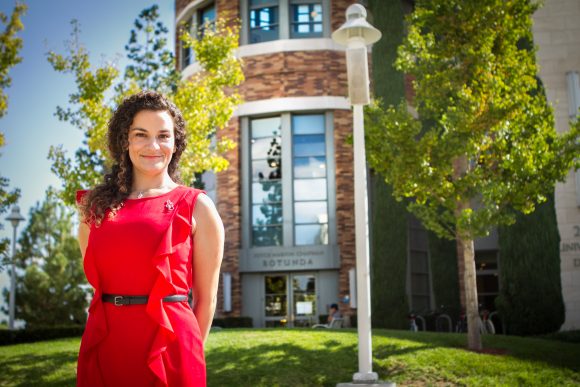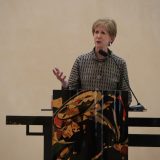
Dr. Bostean Awarded Funds for COVID-19 Research
July 22, 2020
The coronavirus (COVID-19) pandemic continues to impact all parts of the U.S. and the world. Schools and businesses remain closed or are conducting activities remotely, and communities have had to implement controversial social distancing measures. “The magnitude of the crisis we are now facing provides an opportunity for self-reflection– both as individuals, but more importantly as a society– to see how the structure of our society impacts individual lives, inequitably across social groups, and how we can create a social structure that better supports its constituents, especially in times of crisis,” notes Dr. Georgiana Bostean, Associate Professor of Environmental Science, Health, and Policy in Wilkinson College‘s Sociology Department. Chapman University’s Office of Research, through the generous support of the Kay Family Foundation, recently awarded funding for COVID-19 research projects that analyze its impact on health, society and the economy. Dr. Bostean is a co-principal investigator on not just one, but two of the funded projects.
“I am grateful to contribute to research that can help provide policy guidance to mitigate the major negative impacts of the COVID-19 pandemic,” said Dr. Bostean.
Dr. Bostean is an expert in the area of population health and health disparities, focusing on the social determinants of health and how socioeconomic factors in explaining differences in health behaviors and outcomes in ethnic communities.
Her first funded project, Viral Pandemic Health Disparities: An Examination Social and Environmental Determinants of COVID-19 Incidence and Mortality in New York and Los Angeles conducts a comparative study that will collect data in New York, NY and Los Angeles, CA, with the aims of (1) identifying social and environmental factors that may create COVID-19-related health disparities, and (2) developing a Viral Pandemic Risk Index based on neighborhood characteristics. Ethnocultural minority groups have historically suffered higher mortality rates during and after viral pandemics, making it imperative to understand the risk for COVID-19 morbidity and mortality in areas with large ethnocultural minority populations. Dr. Bostean’s role in this research project is creating a risk index to predict areas and cities in LA that are at a higher risk based on health and sociodemographic factors. Dr. Bostean is also working on a portion, led by Dr. Angel Miles Nash (Educational Studies), that examines the distribution of Grab-N-Go food centers throughout Los Angeles Unified School District to determine whether areas with the highest need have sufficient centers. This project represents a wonderful example of interdisciplinary collaboration among Wilkinson College, Crean College of Health and Behavioral Science, the School of Pharmacy, Attallah College of Educational Studies, and Schmid College of Science and Technology.
Her second project pulls together researchers from Wilkinson, Crean, and Schmid Colleges. Identifying Risk and Promoting Resilience in the Midst of the COVID-19 Pandemic: Examining Mental and Physical Health in a National Sample examines how stay-at-home orders, increased social distancing, and the rapid increase of COVID-19 infections in the United States are linked to mental health (anxiety, depression), physical health (COVID-19 diagnosis, weight fluctuation), health behaviors (alcohol/drug use, sleep disturbances), and social relationships (loneliness, relationship conflict). Dr. Bostean is working with Dr. Jennifer Robinette (Health Psychology) to examine neighborhood social cohesion, investigating whether neighborhood cohesion serves as a stress buffer to ameliorate some of the negative mental health impacts of COVID-19 including isolation from staying at home.
The overall project seeks to identify protective factors, such as effective coping strategies and cohesive social neighborhoods promoting resilience. This research team conducted the Chapman University COVID-19 National Mental Health Study (Spring 2020), which examined the experiences of 4,149 people living in the United States.
You can learn more about the results of this study, including beliefs about COVID-19, perceptions of how COVID-19 has influenced romantic relationships, perceived connections between ethnicity and COVID-19, and support for how President Donald Trump is managing COVID-19 and those protesting stay-at-home orders, on the project website.
To learn more about Chapman University COVID-19 research, check out the website.

